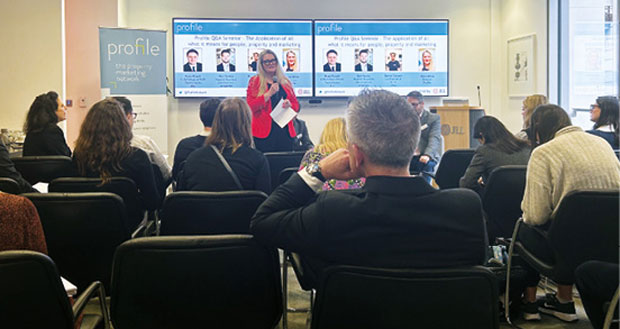 Jo Sutherland, MD, Magenta Associates reports from a seminar on the Application of AI: what it means for people, property and marketing
Jo Sutherland, MD, Magenta Associates reports from a seminar on the Application of AI: what it means for people, property and marketing
In a recent Profile Network event hosted by JLL, technology leaders came together to discuss the transformative power of artificial intelligence (AI) in various industries, particularly focusing on its implications for people and property management. With insights from Ross Powell, EMEA Head of PAM Technologies at JLL, Ben Yexley, Head of Business Development at Askporter, and Daniel Cooper, Co-Founder & CTO at Jitty, the seminar explored how the use of AI has already begun to transform the way the property industry works.
BEYOND THE HYPE
Ross Powell initiated the discussion by addressing common misconceptions surrounding AI. Despite its ubiquitous presence in our daily lives, AI often evokes fear and scepticism due to its portrayal in popular culture. From 2001: A Space Odyssey (1968) that features HAL 9000, a sentient supercomputer that, although not inherently evil, malfunctions and tries to eliminate the human crew, to the more recent I, Robot (2004) that depicts a dystopian future where robots exhibit unpredictable behaviour and kill humans, these films and others have contributed to the popular perception of AI as a potentially dangerous and life-threatening (or at least life-altering) force that sits outside of our control. While they are works of fiction, they arguably reflect societal anxieties and ethical dilemmas surrounding the development and deployment of AI technologies.
This is not a fair or balanced foundation. Powell emphasised that AI is not a standalone entity but rather a tool that evolves alongside humanity. JLL, being at the forefront of technological innovation, has been integrating AI since 2016, particularly focusing on environmental control, data analysis, and enhancing customer experiences in commercial properties.
HI HANK
Powell highlighted JLL’s ground-breaking AI initiatives such as HANK, an innovative sustainability solution powered by AI to deliver fast energy savings and ROI. HANK uses machine learning, energy modelling, and outside data sources to make real-time micro-adjustments and continuously optimise HVAC equipment, reducing energy consumption and costs by 20 per cent. With an ROI guarantee, HANK’s algorithms optimise building environments for comfort and efficiency, and save money in the process. This was the first example of how AI can deliver tangible benefits by analysing factors such as temperature, air quality, and occupant behaviour.
The second example is JLL’s GPT. JLL introduced its own version of the language processing tool, revolutionising its business operations with advanced language processing capabilities and real-time insights for its team who are encouraged to experiment with the platform. The amount of time that has been saved from the platform that specialises in JLL’s business landscape and the property sector has made the investment worthwhile.
I, ROBOT. YOU, HUMAN
The event also featured case studies demonstrating the practical applications of AI. Ben Yexley took to the stage to remind the audience that managing places and real estate assets is time-consuming, high-risk and human resource intensive… without tech, that is. askporter, an AI assistant and communication platform for real estate management, was founded out of the belief that human time is precious. Its mission is to enable people to interact with their real-world environment effortlessly by managing people and places autonomously with AI. Yexley’s passion that no customer should have to sit in an endless call queue and that no team member should have to respond to the same questions repeatedly became increasingly apparent. Humans are meant for more, he argued.
One notable example of where this has become a reality is Legal and General Affordable Homes. Its web assistant helps occupants find out what’s going on when things go wrong by referencing the centralised database that doubles up as an inbuilt library of information. It also teaches people how they can fix problems themselves by showing them helpful videos that relate to the problem in question. Where a visit is required, the web assistant will automatically allocate the work to the relevant provider, stamping the diagnosis clearly to ensure the delivery of a first-time fix. And that is why the platform has streamlined operations, reduced turnaround times, and enhanced customer service.
In a fireside chat, Daniel Cooper from Jitty emphasised the potential of AI in revolutionising industries like the housing market, particularly in data extraction and analysis. With advancements like GPT-4 and Google’s Vertex, AI promises to unlock new possibilities by structuring vast amounts of unstructured data efficiently. However, despite the immense potential, challenges remain, including concerns about data privacy, resource allocation, and the need for effective change management strategies.
NAVIGATING THE AI-POWERED WORLD AHEAD
As the event concluded, speakers offered practical advice for industry leaders apprehensive about embracing AI. Powell stressed the importance of focusing on the value proposition rather than getting lost in technical jargon. Yexley urged a cautious approach, emphasising the importance of starting small and gradually scaling AI implementations to reap efficiency gains. Cooper echoed these sentiments, highlighting the need for investment in change management and emphasising AI as a tool rather than a panacea.
In conclusion, the event underscored the transformative potential of AI in reshaping industries and enhancing human experiences. By embracing innovation, leveraging AI technologies, and fostering a culture of adaptation, businesses can navigate the complexities of the digital age and unlock new opportunities for growth and development.





